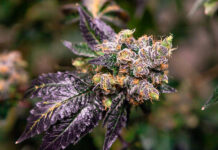
There was a theme to the happenings this week: mea culpa.
Mea culpa is a Latin phrase that roughly translates to “my bad.” It’s an acknowledgement of one’s error. And in the week ending Nov. 3, 2018, I noticed veiled admissions of error, even if no one has actually admitted to fault.
Thailand May Be 1st in Asia to Legalize Medical Marijuana
Thailand could become the first country in Asia to legalize medical cannabis, according to an Nov. 1, 2018, report in Time Magazine.
Currently, the draft bill is under review by the ruling military, but if passed Thailand could profit from an industry that is projected to be worth $55.8 billion globally by 2025, according to an analysis from Grand View Research. Jet Sirathraanon, the chairman of the National Legislative Assembly’s committee on public health, emphasized that cannabis would be lawful “for medication only, not for recreation.”
Thailand could become the first country in Asia to legalize medical marijuana https://t.co/jvIo0pzDGc pic.twitter.com/xyrc2Gno3z
— TIME (@TIME) November 1, 2018
But in 2003, the Thai government executed 2,500 suspected drug traffickers without trial, according to a 2005 report by the International Federation for Human Rights.
Could it be that the opportunity to tap into the growing marijuana market was enough for Thailand to renounce a brutal, pointless war on drugs? Maybe. We’ll have to wait and see, but Thailand does appear to be aware that a drug war is in many ways a fool’s errand when in 2016 then-Justice Minister Paiboon Koomchaya said, “the United States also once declared a war on drugs, and in the end, they surrendered, and fixed the regulations and laws.”.
Mexico Supreme Court: Marijuana Prohibition is Unconstitutional
Mexico’s Supreme Court ruled that the prohibition of marijuana is unconstitutional, effectively opening the door for legalization across the country. Although the rulings do not constitute immediate legalization, the high court’s announcement will authorize Mexico’s newly elected president, Andrés Manuel López Obrador, and Congress to reform laws, according to an Oct. 31, 2018, report by Marijuana Moment.
The fifth such ruling by Mexico’s Supreme Court, the decision creates a legally binding precedent that other judges must now follow. The court’s ruling established “that adults have a fundamental right to personal development which lets them decide their recreational activities without interference from the state.”
Primera Sala reiteró inconstitucionalidad de la prohibición absoluta del consumo recreativo de marihuana. Lo que permitió integrar jurisprudencia sobre el tema. pic.twitter.com/1p9stESEYn
— Suprema Corte (@SCJN) November 1, 2018
In addition to depriving the country’s drug cartels of billions of dollars from black-market sales and halting arrests over a benign substance, they’ve also set the stage for López Obrador’s government to legalize marijuana once he takes office on Saturday Dec. 1, 2018.
While it would be great if Mexico joined Canada and Uruguay in legalizing marijuana, what would that mean for the United States? Will the 66 percent of Americans who believe weed should be legal be enough to sway politicians? Could 2018 be the tipping point for marijuana legalization in the U.S.?
There are still enough anti-marijuana hardliners left in D.C. to make it unlikely, and the U.S. Supreme Court doesn’t seem likely to make a similar ruling as Mexico’s high court. Let’s see what happens during the midterms.
Paul Ryan on CBD: It ‘has proven to work.’
Republican Speaker of the House Paul Ryan stumped for hemp on Oct. 30, 2018. During a campaign for a fellow Republican, Kentucky Rep. Andy Barr, Ryan told the Kentucky crowd that he thinks CBD oil “has proven to work.”
The endorsement for industrial hemp cultivation by Ryan comes at a critical juncture in the legislative process. As congressional leaders seek common ground in the proposed House and Senate versions of the Farm Bill – there remains one major difference. The Senate bill provides language that would legalize the cultivation of industrial hemp while the House bill doesn’t.
This may be a first for a current Speaker of the House. Former Speaker Republican Rep. John Boehner of Ohio, whom Ryan replaced, once famously noted that he was “unalterably opposed” to marijuana legalization, then joined the board of directors at a major marijuana company after retiring from politics.
I’m almost always opposed to Ryan’s policy positions, but I’m always happy to see high-rankings politician defending the intrinsic value of hemp and CBD while they hold their largest platform. It’s of a piece with what we’re seeing in Thailand, Mexico, and, hopefully, in the United States: Elected officials are showing that their anti-marijuana beliefs were based on nothing more than greed, prejudice, and a mountain of lies.















